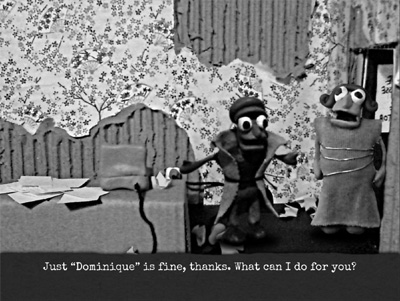Sam: | Hello! In our continuing adventures into cracktastic adventure games, we are reviewing Deirdra Kiai's recent release: |

|
Sam: | It's an indie game with claymation and wacky music, funded on Indiegogo, the Kickstarter for people who want your money even when there's not enough of it to do the thing they said they'd do. |
Jacqueline: | (Except in this case, there was enough. But yeah.) |
Sam: | We apologise in advance for any issues of quality that might result from our doing this review sober, but it's eleven AM on a Saturday and we are not as hardcore as all that. I have rooibos with honey in it. Clearly I am old now. |
Jacqueline: | We also apologize for starting out this review by saying that this is part of our "continuing adventures into cracktastic adventure games," if only because it has been FOUR YEARS since the last time we did one of these. (...wow, we are horrible at continuity, aren't we?)Oh! And a final apology: this review at a later point becomes CHOCK FULL of spoilers, so if you are the sort of person who likes to know whodunnit before you've read a mystery, then by all means keep on reading. Otherwise, you should possibly visit DominiquePamplemousse.com and (virtually) plop down a well-deserved five bucks for the game, then come back and see if you agree with us. |
Sam: | Okay. So Dominique is a googly-eyed trenchcoat detective of unambiguously ambiguous gender, who — |
Jacqueline: | Yeah, I couldn't decide if all the focus on the PC's gender was a statement about how gender didn't matter, or how it is offensive to guess rather than ask one's gender, or if it was a joke that in and of itself wasn't funny because there are people who really struggle with society's binaries, or... yeah. But you stated that well, Sam: the PC is unambiguously ambiguous in that regard. |
|
 Dominique replies to a character who is stumbling over which gender pronoun to use.
Dominique replies to a character who is stumbling over which gender pronoun to use.
|
Sam: | I think I get it, but can we get back to that later? |
Jacqueline: | Yes, but of course. |
Sam: | So Dominique is horribly broke, in the standard Guy Noir fashion, except that in most recyclings of the vaguely-noir detective genre, this is reduced to a sort of conventional genre shorthand without much bite to it. Pamplemousse not only keeps it in the foreground, but ties it strongly into more contemporary themes: the protagonist is a grad-school dropout kept afloat by their parents, and is constantly stymied by the fallout of austerity. |
Jacqueline: | It should be noted that the last graphic adventure game we reviewed, four years ago, was a cracktastic Guy Noir black and white sort of claymation-like game... I wonder what this says about us. Something deep, and possibly twisted. Anyway... |
Sam: | Dominique is given a case by Prudence Van Dunng, music-industry mogul, whose star artist has gone missing. Twists, secrets and lies, and plausibility-stretching coincidences pile up in rapid succession, but you're not here for a rollercoaster plot or fiendishly clever puzzles: you're here because all the characters break into song for no reason. All the time. |
Jacqueline: | It's all rather meta to have a game about the music industry that is a musical, except for the minor detail where characters are often horribly, horribly off key. |
Sam: | Well, yeah. Again, I think it's going for something here, but it's not just that the singing is off-key a lot. It's so off-key that the one autotuned character is still off-key. It's also that the lyrics often don't scan, or would have scanned if the singer didn't put the emphasis in the wrong place, or they fall on awkward half-rhymes, or have the sort of stiff construction you get when someone's trying really hard to get a line to scan and rhyme, even though it ends up doing neither. |
Jacqueline: | I think it is all a grand statement about how the characters' motives are often off-key, or have their emphasis in the wrong place, or are awkward or stiff. Like I said, very meta. |
Sam: | Well - I think this is a game with a pretty solid attitude about beauty and polish in art. It's all of a piece: the blobby, googly-eyed, jerky characters, the peeling crazy wallpaper, the strongly-felt sentiments gracelessly delivered. It's got this kind of punk stance about... well, about beauty as artifice, as not reflecting how the actual world looks. The singing is pretty much as unpolished as it would be if everybody did sing in place of natural speech. |
Jacqueline: | Let us have a moment of silence to express our gratitude that people do not sing instead of talking in our day to day lives. |
Sam: | [...] |
Jacqueline: | [...] |
Sam: | Actually, in secondary school one of my friends and I used to communicate in cod-operatic singing all the time, when the teacher was out of the room and we'd done all the work and were bored. Except that he had choral training, and I was just sort of crap. But we found it highly entertaining, anyway. |
Jacqueline: | I'm trying to think of a response to that which doesn't result in me ending up on the couch tonight.[...]Yeah, I've got nothin'. Possibly I am incapable of rational thought because I have a song from Once More With Feeling stuck in my head. |
Sam: | Which song? |
Jacqueline: | It's that love song where Tara sings, "you make me cooompleeeeete" OVER AND OVER AND OVER to Willow (or, at least, Tara sings that same bit over and over and over in my head). |
Sam: | Dominique Pamplemousse will not earworm you with actual lyrics, I think, but I've had porp-porp porp-porp brass stuck in my head all morning. |
Jacqueline: | You play a mean air trombone, by the way. I asked Deirdra whether it should actually be an air sousaphone, but apparently those are less dramatic. |
Sam: | So, to spoil things a little (okay, to spoil everything), the way the plot turns out is that the missing teen pop star has been involved in a nefarious plot involving the theft of a prototype autotune necktie that Dominique developed as a grad student before funding got cut, but BOWTIE SCIENCE has GONE MAD and now he can't take the thing off, condemning him to a life of perpetual autotune warble before it kills him. PERCHANCE THIS IS A METAPHOR OF SOME KIND. |
Jacqueline: | See, I didn't really contemplate all the heavy symbolism of this game until we started discussing it here. Possibly this is one of those things where your English teacher insists that the curtains in the story are blue to illustrate the profound melancholy the protagonist carries in their soul after the loss of their first love, except that if you asked the author, she would tell you that the curtains were blue just because she likes blue. |
|
 The prison cell represents the artificial normative categories into which we are all thrust, as acts of violence, by the kyriarchy. The bagpipes represent suffering.
The prison cell represents the artificial normative categories into which we are all thrust, as acts of violence, by the kyriarchy. The bagpipes represent suffering.
|
Sam: | Dude your attitude to litcrit was basically carved on a rock by a caveman using another rock. Thog sceptical of Marxist analysis of Urug's Some Tasty Horses. |
Jacqueline: | That's it. Now I know I'm not on the couch tonight, because there won't be room for both of us—and you, sir, are on the couch tonight. |
Sam: | Well, yeah, I didn't put the whole thing together immediately as I was playing it, partly because I process slowly but mostly because my brain functions were divided between 'what the everliving fuck' and 'mmm, this ginger ale and vodka is delicious.' But it's not, y'know, a deeply buried theme or anything. |
Jacqueline: | (In case you are confused by Sam's reference to vodka after we have professed that this is a review written sober on a Saturday morning, it should be noted that we are writing this review the morning after we completed the game. The game is short. It took up a bit of two evenings, but could have been easily finished in a sitting. Surprisingly, I felt it was still worth the $5 we paid, despite the short play time, as it kind of did feel like a double-length B-film we had rented.) |
Sam: | Yeah, I've seen a lot of reviews call Pamplemousse charming, and that's pretty much right, but what gets mentioned less is that it's compact; game plots in general tend to devote a lot of space to padding, treading water, wasting your time to make you feel as though you haven't wasted your money. And there isn't much of that in Pamplemousse: it has a bam-bam-bam plot-movement-every-scene pace that puts me in mind of a good oneshot freeformish RPG, possibly because I apparently think of everything in those terms these days. Nor is it congested by unfair or overcomplicated puzzles: the puzzle design has good flow without being trivial. |
Jacqueline: | Agreed, but before we keep saying too many nice things about Pamplemousse, I'd like to complain about a key element where this game truly failed to deliver. |
Sam: | What element might that be, love of my life and my reason for living? |
Jacqueline: | There is not a single grapefruit in this game, nor a single silly French accent, and I was hoping for one, the other, or both. I guess that makes two key elements on which Pamplemousse failed to deliver. |
Sam: | There are some bad anglicised puns on Pamplemousse. Will that do? |
Jacqueline: | Well, you're right. There was that. What was my favorite one? Poopymoose, or something like that. Also, Kiai gets an extra point for including an actual moose (even though it's dead). |
|

|
Jacqueline: | Say, can we circle back to the gender issue we were discussing earlier? |
Sam: | I never found a good segue to it, so I thought I'd just say 'we should have a Conversation about Gender now' and then you could cue up some SFX of people stampeding for the exits. |
Jacqueline: | Har har. On the contrary, this is an element that Kiai really wanted to explore in the game, so we should definitely touch on it a bit more. Kiai stated in the Indiegogo campaign for Pamplemousse that she is "known for touching on personal issues in [her] work, such as feminism, race, gender, coming of age, and social awkwardness -- subjects you'd be hard-pressed to find in most big budget videogame productions [and that] videogames aren't just frivolous wastes of time to [her]; they're how" she expresses herself. |
Sam: | Well, it's a bit difficult to say a whole lot about it here, because the main way that the issue is raised is as a sort of running gag that isn't actually funny: other characters are confused by, or want to know, or assume they know Dominique's gender, and Dominique is annoyed about it, and then the plot moves on. |
Jacqueline: | Yeah, I guess that's why the first time it came up I dismissed it, and then when it kept coming up over and over I wasn't quite sure what the game was trying to do.I had a similar feeling when we encountered a character that appeared to be in the early stages of dementia and it felt at first as if the player was supposed to find it amusing (even though it wasn't), then as it went on it felt like it was a plot device, and then it ultimately turned out that the character was faking it. Given how frightening dementia can be, I'm not sure if there was a statement being made here (if so, it wasn't a clear enough message, in my opinion). Honestly, I was left with this feeling that using this condition as a plot device felt very wrong, but of course, in real life it's plausible that someone might actually fake the condition for the reasons this character did. Maybe. Oh, hell, I don't know... Sam, what was your take on this bit? |
|
 Dominique Pamplemousse responds to someone asking if they're a boy or a girl.
Dominique Pamplemousse responds to someone asking if they're a boy or a girl.
|
Sam: | Well, hm. I think that sometimes it's useful for a story to say 'SO HEY EVERYBODY THIS THING EXISTS' without necessarily saying anything much further about it. This is kind of easy to miss if you already know the thing exists and are waiting for the next bit.
With the dementia thing I sort of see it in the broader context of how the game treats its characters, which is that literally nobody in the story is actually how they appear to be at first — the landlady's an undercover cop, the mallrat teenager's scheming about running off to college rather than eloping with a no-good boy, and so on. So there's a sort of message here about how Making Assumptions About People Is Wrong - except that several of the characters (misre)present themselves in ways that are actively malicious, so I'm not sure how well that holds up across the entire story. |
Jacqueline: | Hm, yes. Great observation. Maybe you don't have to sleep on the couch tonight after all. Not only are you smart and thoughtful, but to put you out on the couch would only prop up outdated gender relation stereotypes. |
Sam: | So, uh, by sleeping in bed with my wife I am DEFEATING HETERONORMATIVITY? That is some awesome moon-logic, dear. |
Jacqueline: | Why, thank you.So anyway, yeah, I enjoyed it overall. It's funky, it's definitely different, it's compact and does just what it wants to do without feeling like it's got to pad out the play length with stuff that wastes the player's time. It's over the top silly but in a way that's rather infectious. I really liked how Andrew Plotkin described it: |
|
|
Sam: | Yes, that was one of the better Lincolns we've dropped in a while. I mean, the sung credits alone are worth the price of admission. |
Jacqueline: | Yes! So true.Anyway, thanks for reading this! Hopefully you read this review after already playing the game, so as not to be thoroughly spoiled, but if you are one of those people (who I don't quite get) who are okay with knowing how a story ends before you read it and you haven't yet played Dominique Pamplemousse, then what are you waiting for? Go buy it now at DominiquePamplemousse.com!Seriously... go. Do it now. |









